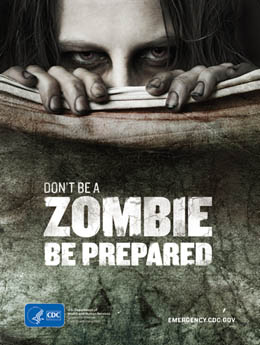So you’re just trying to live your normal little life, when out of the blue vampires and zombies start their own battle for global domination. What’s a poor human to do?
 It’s fun to mentally compare the strengths and weaknesses of both monsters, as was done at the recent Six O’Clock Series event, “Vampires vs. Zombies: The Debate.” Two authors of books that discussed how to survive their respective favorite creature outbreak squared off to support their choice of the winner. Scott Bowen (The Vampire Survival Guide) and Matt Mogk (Everything you Ever Wanted to Know about Zombies) have appeared on Spike TV’s Deadliest Warrior, which featured an episode that attempted to demonstrate who would win. Claws were compared to bites, and intelligent yet emotional killing machines were compared to a horde of unstoppable and mindless abattoirs on feet.
It’s fun to mentally compare the strengths and weaknesses of both monsters, as was done at the recent Six O’Clock Series event, “Vampires vs. Zombies: The Debate.” Two authors of books that discussed how to survive their respective favorite creature outbreak squared off to support their choice of the winner. Scott Bowen (The Vampire Survival Guide) and Matt Mogk (Everything you Ever Wanted to Know about Zombies) have appeared on Spike TV’s Deadliest Warrior, which featured an episode that attempted to demonstrate who would win. Claws were compared to bites, and intelligent yet emotional killing machines were compared to a horde of unstoppable and mindless abattoirs on feet.
The winner on Deadliest Warrior was vampires, but by an extremely narrow margin (the Six O’Clock Series audience’s vote was decidedly in favor of zombies). The comparisons were fun, and the examples, though gruesome, were light-hearted because, after all, we’re talking about fictional creatures and an impossible scenario. But there was one point, almost idly mentioned in passing, that carries serious relevance: The Centers for Disease Control has created printed publications and a website on how to survive a zombie apocalypse.
The tongue-in-cheek campaign has become an effective way to help people think about disaster preparedness. As the website notes, “If you are generally well equipped to deal with a zombie apocalypse, you will be prepared for a hurricane, pandemic, earthquake, or terrorist attack.”
When hordes of the undead start menacing society, people may start thinking more about protecting their families than going to work. Roads may become impassable, and, as services begin to break down, there would be shortages of food and water. Deliveries of critical supplies, such as gasoline, oil, and medicine, would slow down or stop. Power outages would become an issue, as would lack of sanitation. The results of a disaster would be similar no matter the cause: zombie horde or terrorist attack, natural disaster (volcano or earthquake) or manmade (nuclear accident or biological contamination).
 When vampires and zombies wage war, or when any catastrophe occurs, humanity will feel the results. In the end, it doesn’t matter which of the monsters win. It’s all about how we handle the situation and what we do to save ourselves.
When vampires and zombies wage war, or when any catastrophe occurs, humanity will feel the results. In the end, it doesn’t matter which of the monsters win. It’s all about how we handle the situation and what we do to save ourselves.
So learn how to survive a zombie attack. Be ready for when the battle rolls onto your lawn. Let’s hope catastrophe will never strike home in your lifetime. But knowing that you are prepared, in at least some small measure, will help you fall back to sleep easier when you hear that mysterious bump in the night.

 Update, November 11: The BBC also featured this discovery, and the report can be seen on the
Update, November 11: The BBC also featured this discovery, and the report can be seen on the  It’s going to get a little hairy around campus this month.
It’s going to get a little hairy around campus this month.